LAW101 Business Law Assignment: Australian Contract Law Analysis
VerifiedAdded on 2023/06/15
|11
|2821
|208
Report
AI Summary
This business law assignment provides a comprehensive analysis of contract law principles in Australia, referencing relevant common law and equity principles. It examines scenarios involving Mojo Beverages and Ben, Dorper Sheep Sellers Pty Ltd and Livestock Brokers, and Stuart and Westphalia Marts, focusing on offer, acceptance, consideration, and promissory estoppel. The assignment applies legal precedents such as Carlill v Carbolic Smoke Ball Company and Central London Property Trust Ltd v High Trees House Ltd to determine the existence of valid contracts and the rights of the parties involved. It also discusses the concepts of counter-offers, postal rules, unconscionable conduct, and misrepresentation, concluding whether contracts were formed and what legal recourse, if any, is available. Desklib provides access to this and many other solved assignments for students.

Business Law Assignment
Paraphrase This Document
Need a fresh take? Get an instant paraphrase of this document with our AI Paraphraser
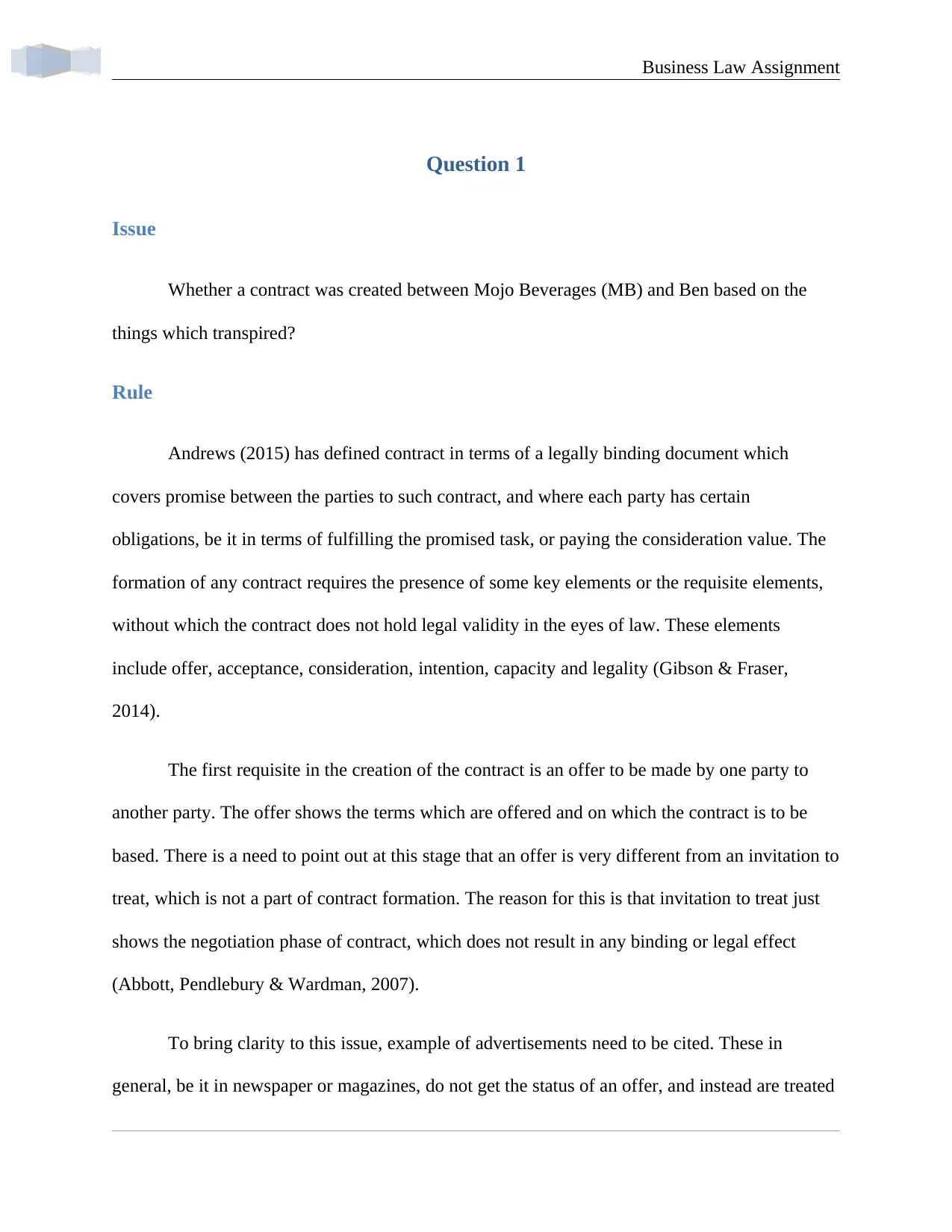
Business Law Assignment
Question 1
Issue
Whether a contract was created between Mojo Beverages (MB) and Ben based on the
things which transpired?
Rule
Andrews (2015) has defined contract in terms of a legally binding document which
covers promise between the parties to such contract, and where each party has certain
obligations, be it in terms of fulfilling the promised task, or paying the consideration value. The
formation of any contract requires the presence of some key elements or the requisite elements,
without which the contract does not hold legal validity in the eyes of law. These elements
include offer, acceptance, consideration, intention, capacity and legality (Gibson & Fraser,
2014).
The first requisite in the creation of the contract is an offer to be made by one party to
another party. The offer shows the terms which are offered and on which the contract is to be
based. There is a need to point out at this stage that an offer is very different from an invitation to
treat, which is not a part of contract formation. The reason for this is that invitation to treat just
shows the negotiation phase of contract, which does not result in any binding or legal effect
(Abbott, Pendlebury & Wardman, 2007).
To bring clarity to this issue, example of advertisements need to be cited. These in
general, be it in newspaper or magazines, do not get the status of an offer, and instead are treated
Question 1
Issue
Whether a contract was created between Mojo Beverages (MB) and Ben based on the
things which transpired?
Rule
Andrews (2015) has defined contract in terms of a legally binding document which
covers promise between the parties to such contract, and where each party has certain
obligations, be it in terms of fulfilling the promised task, or paying the consideration value. The
formation of any contract requires the presence of some key elements or the requisite elements,
without which the contract does not hold legal validity in the eyes of law. These elements
include offer, acceptance, consideration, intention, capacity and legality (Gibson & Fraser,
2014).
The first requisite in the creation of the contract is an offer to be made by one party to
another party. The offer shows the terms which are offered and on which the contract is to be
based. There is a need to point out at this stage that an offer is very different from an invitation to
treat, which is not a part of contract formation. The reason for this is that invitation to treat just
shows the negotiation phase of contract, which does not result in any binding or legal effect
(Abbott, Pendlebury & Wardman, 2007).
To bring clarity to this issue, example of advertisements need to be cited. These in
general, be it in newspaper or magazines, do not get the status of an offer, and instead are treated
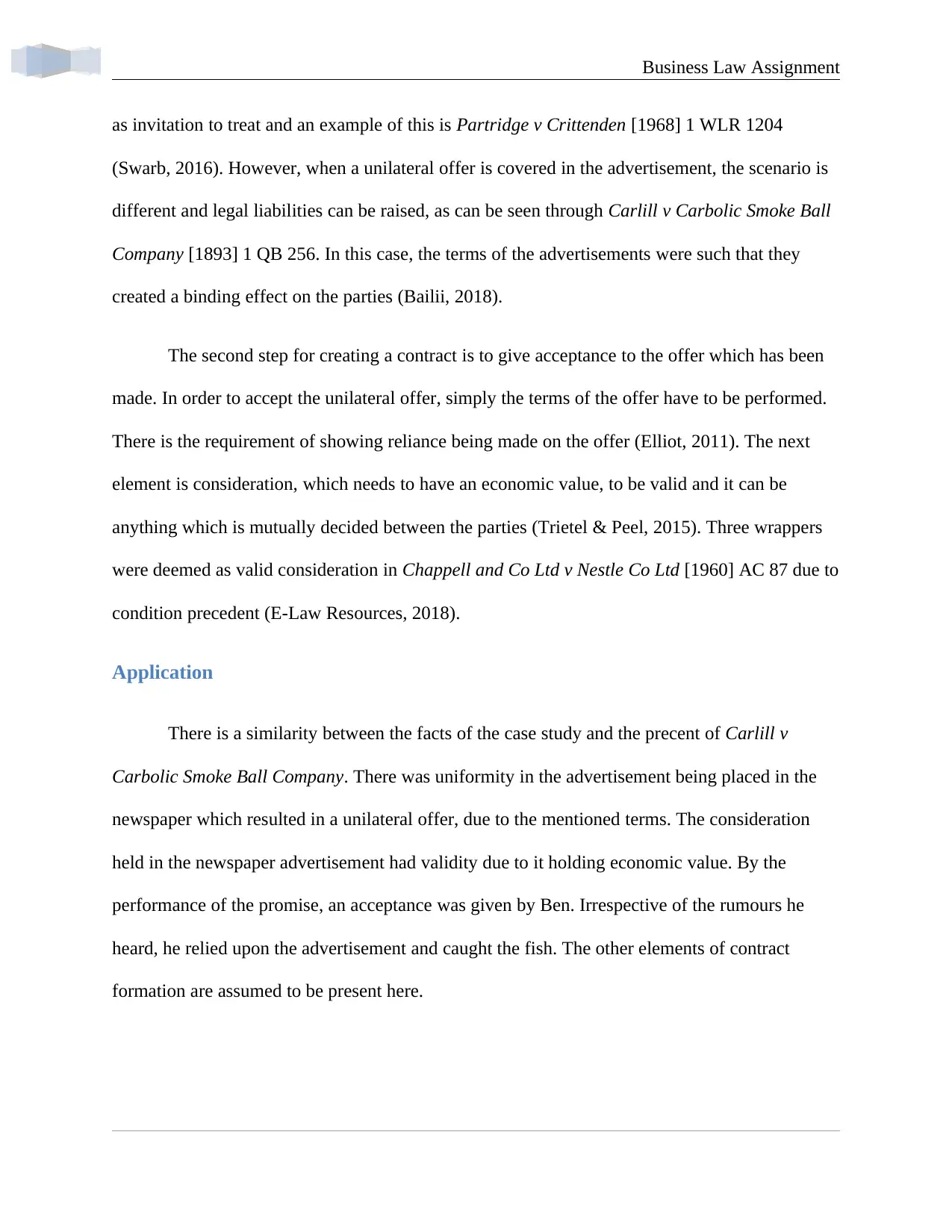
Business Law Assignment
as invitation to treat and an example of this is Partridge v Crittenden [1968] 1 WLR 1204
(Swarb, 2016). However, when a unilateral offer is covered in the advertisement, the scenario is
different and legal liabilities can be raised, as can be seen through Carlill v Carbolic Smoke Ball
Company [1893] 1 QB 256. In this case, the terms of the advertisements were such that they
created a binding effect on the parties (Bailii, 2018).
The second step for creating a contract is to give acceptance to the offer which has been
made. In order to accept the unilateral offer, simply the terms of the offer have to be performed.
There is the requirement of showing reliance being made on the offer (Elliot, 2011). The next
element is consideration, which needs to have an economic value, to be valid and it can be
anything which is mutually decided between the parties (Trietel & Peel, 2015). Three wrappers
were deemed as valid consideration in Chappell and Co Ltd v Nestle Co Ltd [1960] AC 87 due to
condition precedent (E-Law Resources, 2018).
Application
There is a similarity between the facts of the case study and the precent of Carlill v
Carbolic Smoke Ball Company. There was uniformity in the advertisement being placed in the
newspaper which resulted in a unilateral offer, due to the mentioned terms. The consideration
held in the newspaper advertisement had validity due to it holding economic value. By the
performance of the promise, an acceptance was given by Ben. Irrespective of the rumours he
heard, he relied upon the advertisement and caught the fish. The other elements of contract
formation are assumed to be present here.
as invitation to treat and an example of this is Partridge v Crittenden [1968] 1 WLR 1204
(Swarb, 2016). However, when a unilateral offer is covered in the advertisement, the scenario is
different and legal liabilities can be raised, as can be seen through Carlill v Carbolic Smoke Ball
Company [1893] 1 QB 256. In this case, the terms of the advertisements were such that they
created a binding effect on the parties (Bailii, 2018).
The second step for creating a contract is to give acceptance to the offer which has been
made. In order to accept the unilateral offer, simply the terms of the offer have to be performed.
There is the requirement of showing reliance being made on the offer (Elliot, 2011). The next
element is consideration, which needs to have an economic value, to be valid and it can be
anything which is mutually decided between the parties (Trietel & Peel, 2015). Three wrappers
were deemed as valid consideration in Chappell and Co Ltd v Nestle Co Ltd [1960] AC 87 due to
condition precedent (E-Law Resources, 2018).
Application
There is a similarity between the facts of the case study and the precent of Carlill v
Carbolic Smoke Ball Company. There was uniformity in the advertisement being placed in the
newspaper which resulted in a unilateral offer, due to the mentioned terms. The consideration
held in the newspaper advertisement had validity due to it holding economic value. By the
performance of the promise, an acceptance was given by Ben. Irrespective of the rumours he
heard, he relied upon the advertisement and caught the fish. The other elements of contract
formation are assumed to be present here.
⊘ This is a preview!⊘
Do you want full access?
Subscribe today to unlock all pages.

Trusted by 1+ million students worldwide
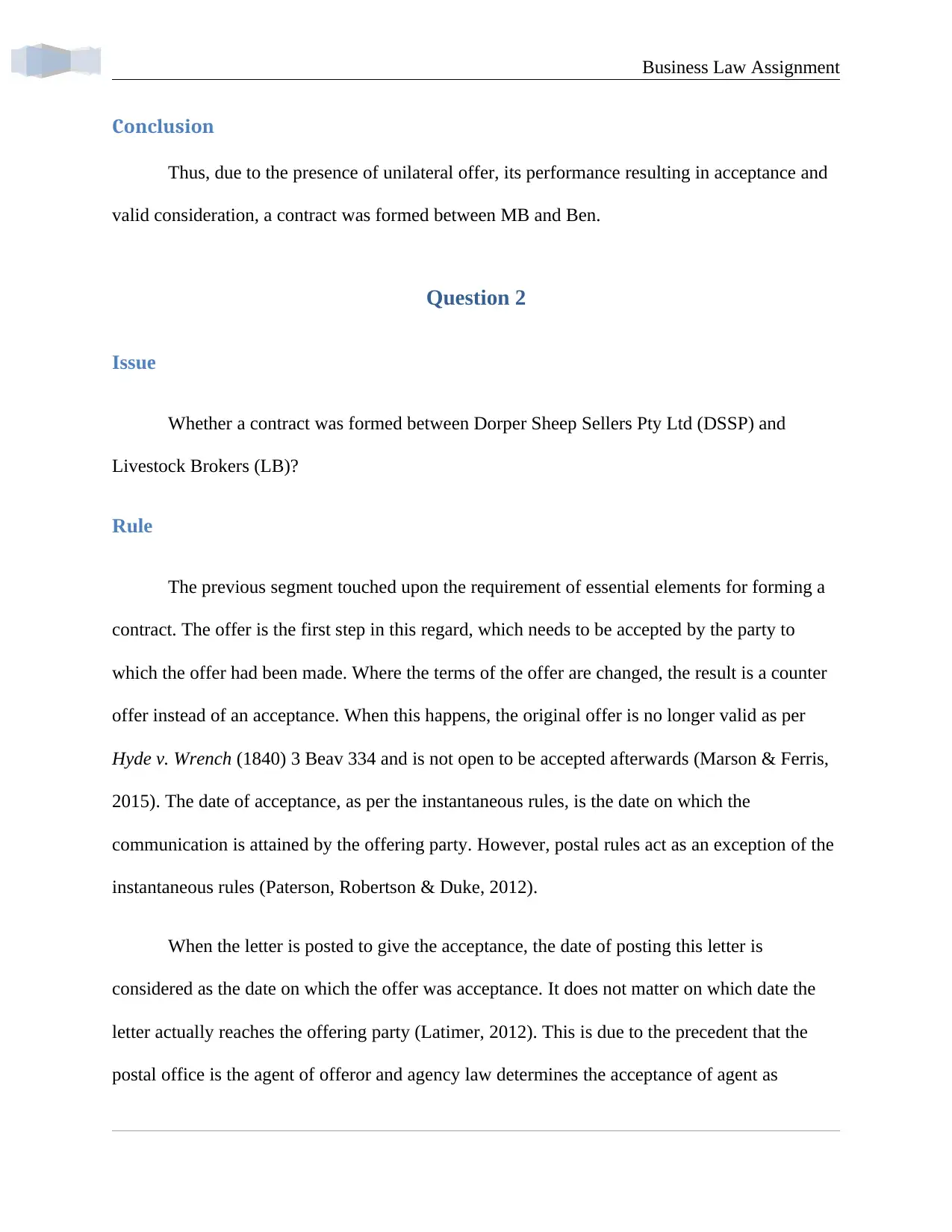
Business Law Assignment
Conclusion
Thus, due to the presence of unilateral offer, its performance resulting in acceptance and
valid consideration, a contract was formed between MB and Ben.
Question 2
Issue
Whether a contract was formed between Dorper Sheep Sellers Pty Ltd (DSSP) and
Livestock Brokers (LB)?
Rule
The previous segment touched upon the requirement of essential elements for forming a
contract. The offer is the first step in this regard, which needs to be accepted by the party to
which the offer had been made. Where the terms of the offer are changed, the result is a counter
offer instead of an acceptance. When this happens, the original offer is no longer valid as per
Hyde v. Wrench (1840) 3 Beav 334 and is not open to be accepted afterwards (Marson & Ferris,
2015). The date of acceptance, as per the instantaneous rules, is the date on which the
communication is attained by the offering party. However, postal rules act as an exception of the
instantaneous rules (Paterson, Robertson & Duke, 2012).
When the letter is posted to give the acceptance, the date of posting this letter is
considered as the date on which the offer was acceptance. It does not matter on which date the
letter actually reaches the offering party (Latimer, 2012). This is due to the precedent that the
postal office is the agent of offeror and agency law determines the acceptance of agent as
Conclusion
Thus, due to the presence of unilateral offer, its performance resulting in acceptance and
valid consideration, a contract was formed between MB and Ben.
Question 2
Issue
Whether a contract was formed between Dorper Sheep Sellers Pty Ltd (DSSP) and
Livestock Brokers (LB)?
Rule
The previous segment touched upon the requirement of essential elements for forming a
contract. The offer is the first step in this regard, which needs to be accepted by the party to
which the offer had been made. Where the terms of the offer are changed, the result is a counter
offer instead of an acceptance. When this happens, the original offer is no longer valid as per
Hyde v. Wrench (1840) 3 Beav 334 and is not open to be accepted afterwards (Marson & Ferris,
2015). The date of acceptance, as per the instantaneous rules, is the date on which the
communication is attained by the offering party. However, postal rules act as an exception of the
instantaneous rules (Paterson, Robertson & Duke, 2012).
When the letter is posted to give the acceptance, the date of posting this letter is
considered as the date on which the offer was acceptance. It does not matter on which date the
letter actually reaches the offering party (Latimer, 2012). This is due to the precedent that the
postal office is the agent of offeror and agency law determines the acceptance of agent as
Paraphrase This Document
Need a fresh take? Get an instant paraphrase of this document with our AI Paraphraser
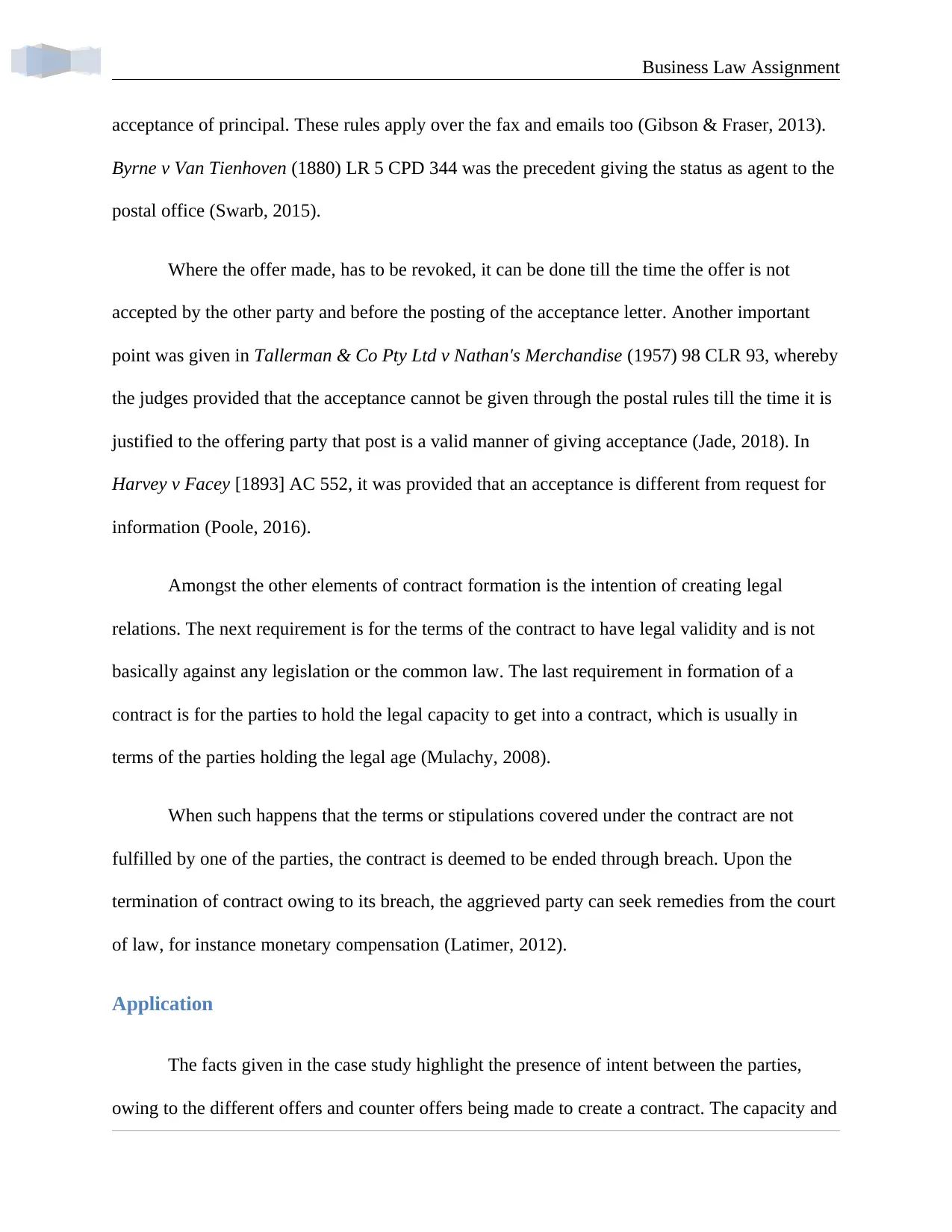
Business Law Assignment
acceptance of principal. These rules apply over the fax and emails too (Gibson & Fraser, 2013).
Byrne v Van Tienhoven (1880) LR 5 CPD 344 was the precedent giving the status as agent to the
postal office (Swarb, 2015).
Where the offer made, has to be revoked, it can be done till the time the offer is not
accepted by the other party and before the posting of the acceptance letter. Another important
point was given in Tallerman & Co Pty Ltd v Nathan's Merchandise (1957) 98 CLR 93, whereby
the judges provided that the acceptance cannot be given through the postal rules till the time it is
justified to the offering party that post is a valid manner of giving acceptance (Jade, 2018). In
Harvey v Facey [1893] AC 552, it was provided that an acceptance is different from request for
information (Poole, 2016).
Amongst the other elements of contract formation is the intention of creating legal
relations. The next requirement is for the terms of the contract to have legal validity and is not
basically against any legislation or the common law. The last requirement in formation of a
contract is for the parties to hold the legal capacity to get into a contract, which is usually in
terms of the parties holding the legal age (Mulachy, 2008).
When such happens that the terms or stipulations covered under the contract are not
fulfilled by one of the parties, the contract is deemed to be ended through breach. Upon the
termination of contract owing to its breach, the aggrieved party can seek remedies from the court
of law, for instance monetary compensation (Latimer, 2012).
Application
The facts given in the case study highlight the presence of intent between the parties,
owing to the different offers and counter offers being made to create a contract. The capacity and
acceptance of principal. These rules apply over the fax and emails too (Gibson & Fraser, 2013).
Byrne v Van Tienhoven (1880) LR 5 CPD 344 was the precedent giving the status as agent to the
postal office (Swarb, 2015).
Where the offer made, has to be revoked, it can be done till the time the offer is not
accepted by the other party and before the posting of the acceptance letter. Another important
point was given in Tallerman & Co Pty Ltd v Nathan's Merchandise (1957) 98 CLR 93, whereby
the judges provided that the acceptance cannot be given through the postal rules till the time it is
justified to the offering party that post is a valid manner of giving acceptance (Jade, 2018). In
Harvey v Facey [1893] AC 552, it was provided that an acceptance is different from request for
information (Poole, 2016).
Amongst the other elements of contract formation is the intention of creating legal
relations. The next requirement is for the terms of the contract to have legal validity and is not
basically against any legislation or the common law. The last requirement in formation of a
contract is for the parties to hold the legal capacity to get into a contract, which is usually in
terms of the parties holding the legal age (Mulachy, 2008).
When such happens that the terms or stipulations covered under the contract are not
fulfilled by one of the parties, the contract is deemed to be ended through breach. Upon the
termination of contract owing to its breach, the aggrieved party can seek remedies from the court
of law, for instance monetary compensation (Latimer, 2012).
Application
The facts given in the case study highlight the presence of intent between the parties,
owing to the different offers and counter offers being made to create a contract. The capacity and
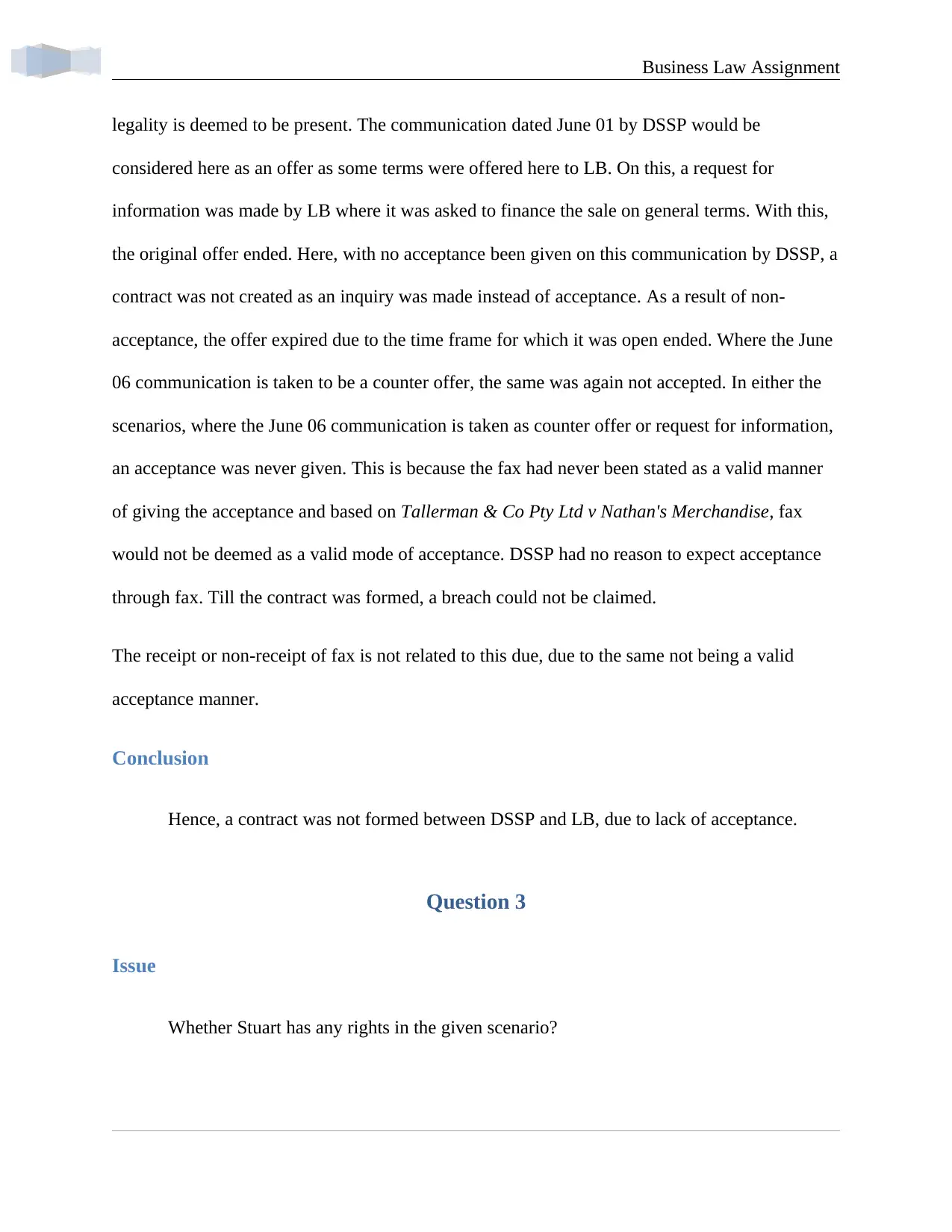
Business Law Assignment
legality is deemed to be present. The communication dated June 01 by DSSP would be
considered here as an offer as some terms were offered here to LB. On this, a request for
information was made by LB where it was asked to finance the sale on general terms. With this,
the original offer ended. Here, with no acceptance been given on this communication by DSSP, a
contract was not created as an inquiry was made instead of acceptance. As a result of non-
acceptance, the offer expired due to the time frame for which it was open ended. Where the June
06 communication is taken to be a counter offer, the same was again not accepted. In either the
scenarios, where the June 06 communication is taken as counter offer or request for information,
an acceptance was never given. This is because the fax had never been stated as a valid manner
of giving the acceptance and based on Tallerman & Co Pty Ltd v Nathan's Merchandise, fax
would not be deemed as a valid mode of acceptance. DSSP had no reason to expect acceptance
through fax. Till the contract was formed, a breach could not be claimed.
The receipt or non-receipt of fax is not related to this due, due to the same not being a valid
acceptance manner.
Conclusion
Hence, a contract was not formed between DSSP and LB, due to lack of acceptance.
Question 3
Issue
Whether Stuart has any rights in the given scenario?
legality is deemed to be present. The communication dated June 01 by DSSP would be
considered here as an offer as some terms were offered here to LB. On this, a request for
information was made by LB where it was asked to finance the sale on general terms. With this,
the original offer ended. Here, with no acceptance been given on this communication by DSSP, a
contract was not created as an inquiry was made instead of acceptance. As a result of non-
acceptance, the offer expired due to the time frame for which it was open ended. Where the June
06 communication is taken to be a counter offer, the same was again not accepted. In either the
scenarios, where the June 06 communication is taken as counter offer or request for information,
an acceptance was never given. This is because the fax had never been stated as a valid manner
of giving the acceptance and based on Tallerman & Co Pty Ltd v Nathan's Merchandise, fax
would not be deemed as a valid mode of acceptance. DSSP had no reason to expect acceptance
through fax. Till the contract was formed, a breach could not be claimed.
The receipt or non-receipt of fax is not related to this due, due to the same not being a valid
acceptance manner.
Conclusion
Hence, a contract was not formed between DSSP and LB, due to lack of acceptance.
Question 3
Issue
Whether Stuart has any rights in the given scenario?
⊘ This is a preview!⊘
Do you want full access?
Subscribe today to unlock all pages.

Trusted by 1+ million students worldwide
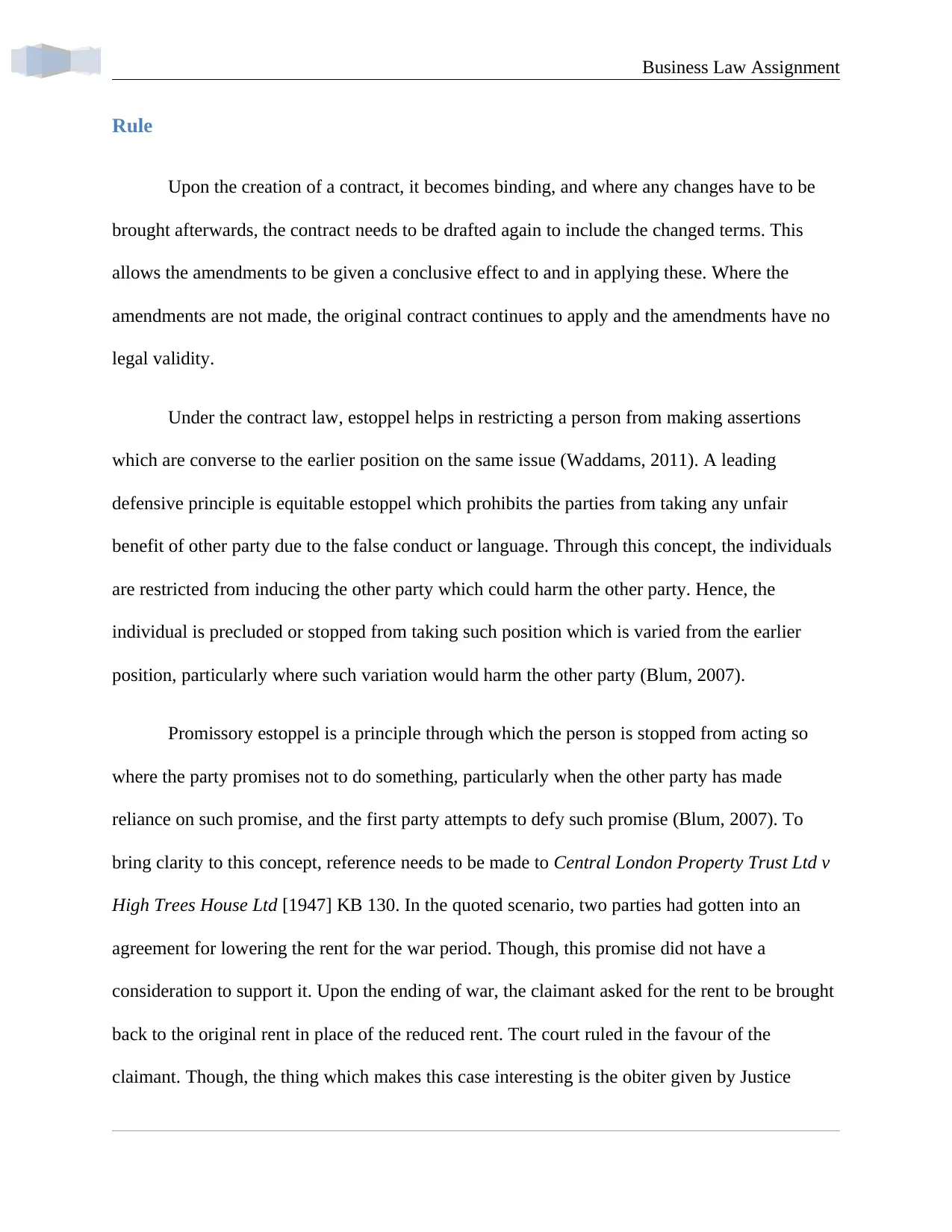
Business Law Assignment
Rule
Upon the creation of a contract, it becomes binding, and where any changes have to be
brought afterwards, the contract needs to be drafted again to include the changed terms. This
allows the amendments to be given a conclusive effect to and in applying these. Where the
amendments are not made, the original contract continues to apply and the amendments have no
legal validity.
Under the contract law, estoppel helps in restricting a person from making assertions
which are converse to the earlier position on the same issue (Waddams, 2011). A leading
defensive principle is equitable estoppel which prohibits the parties from taking any unfair
benefit of other party due to the false conduct or language. Through this concept, the individuals
are restricted from inducing the other party which could harm the other party. Hence, the
individual is precluded or stopped from taking such position which is varied from the earlier
position, particularly where such variation would harm the other party (Blum, 2007).
Promissory estoppel is a principle through which the person is stopped from acting so
where the party promises not to do something, particularly when the other party has made
reliance on such promise, and the first party attempts to defy such promise (Blum, 2007). To
bring clarity to this concept, reference needs to be made to Central London Property Trust Ltd v
High Trees House Ltd [1947] KB 130. In the quoted scenario, two parties had gotten into an
agreement for lowering the rent for the war period. Though, this promise did not have a
consideration to support it. Upon the ending of war, the claimant asked for the rent to be brought
back to the original rent in place of the reduced rent. The court ruled in the favour of the
claimant. Though, the thing which makes this case interesting is the obiter given by Justice
Rule
Upon the creation of a contract, it becomes binding, and where any changes have to be
brought afterwards, the contract needs to be drafted again to include the changed terms. This
allows the amendments to be given a conclusive effect to and in applying these. Where the
amendments are not made, the original contract continues to apply and the amendments have no
legal validity.
Under the contract law, estoppel helps in restricting a person from making assertions
which are converse to the earlier position on the same issue (Waddams, 2011). A leading
defensive principle is equitable estoppel which prohibits the parties from taking any unfair
benefit of other party due to the false conduct or language. Through this concept, the individuals
are restricted from inducing the other party which could harm the other party. Hence, the
individual is precluded or stopped from taking such position which is varied from the earlier
position, particularly where such variation would harm the other party (Blum, 2007).
Promissory estoppel is a principle through which the person is stopped from acting so
where the party promises not to do something, particularly when the other party has made
reliance on such promise, and the first party attempts to defy such promise (Blum, 2007). To
bring clarity to this concept, reference needs to be made to Central London Property Trust Ltd v
High Trees House Ltd [1947] KB 130. In the quoted scenario, two parties had gotten into an
agreement for lowering the rent for the war period. Though, this promise did not have a
consideration to support it. Upon the ending of war, the claimant asked for the rent to be brought
back to the original rent in place of the reduced rent. The court ruled in the favour of the
claimant. Though, the thing which makes this case interesting is the obiter given by Justice
Paraphrase This Document
Need a fresh take? Get an instant paraphrase of this document with our AI Paraphraser
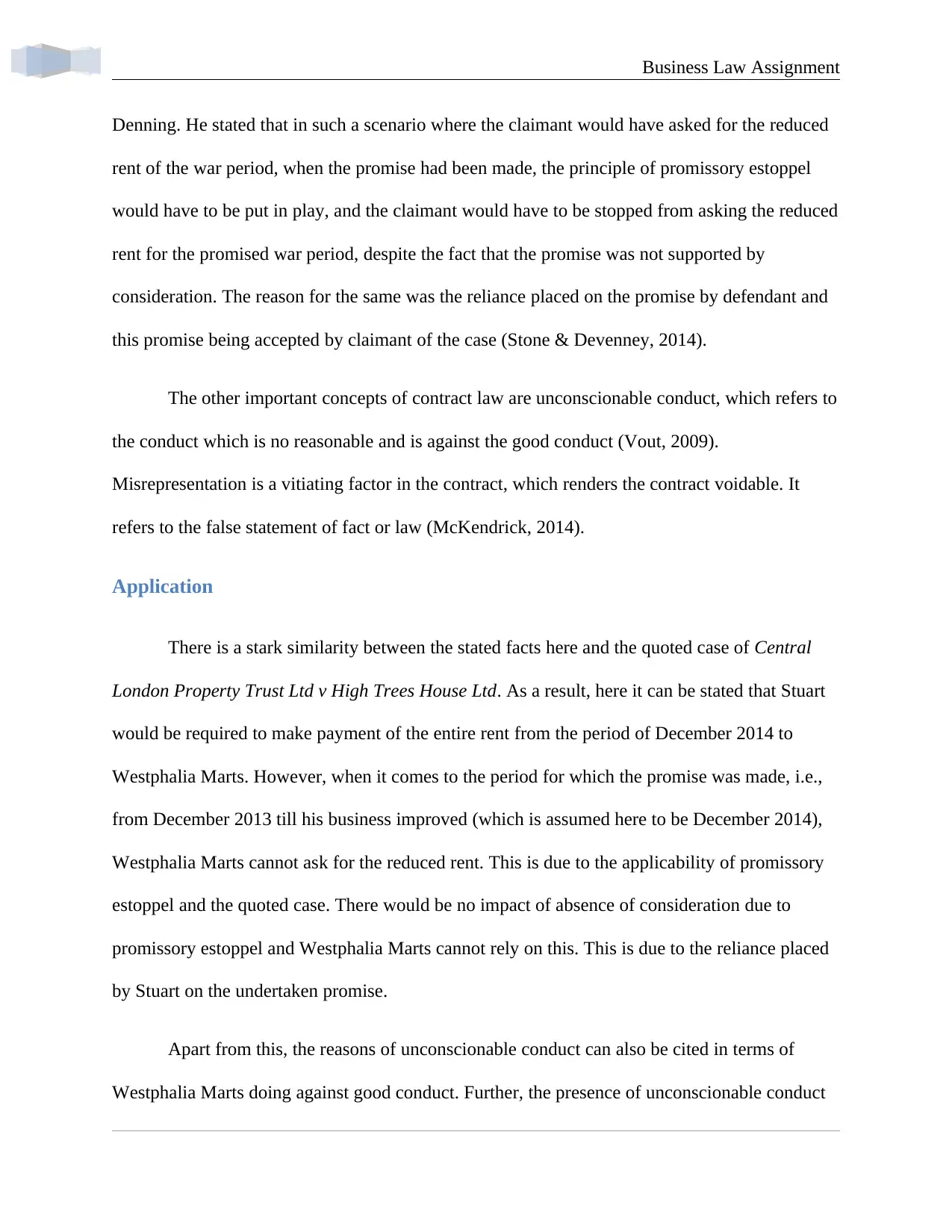
Business Law Assignment
Denning. He stated that in such a scenario where the claimant would have asked for the reduced
rent of the war period, when the promise had been made, the principle of promissory estoppel
would have to be put in play, and the claimant would have to be stopped from asking the reduced
rent for the promised war period, despite the fact that the promise was not supported by
consideration. The reason for the same was the reliance placed on the promise by defendant and
this promise being accepted by claimant of the case (Stone & Devenney, 2014).
The other important concepts of contract law are unconscionable conduct, which refers to
the conduct which is no reasonable and is against the good conduct (Vout, 2009).
Misrepresentation is a vitiating factor in the contract, which renders the contract voidable. It
refers to the false statement of fact or law (McKendrick, 2014).
Application
There is a stark similarity between the stated facts here and the quoted case of Central
London Property Trust Ltd v High Trees House Ltd. As a result, here it can be stated that Stuart
would be required to make payment of the entire rent from the period of December 2014 to
Westphalia Marts. However, when it comes to the period for which the promise was made, i.e.,
from December 2013 till his business improved (which is assumed here to be December 2014),
Westphalia Marts cannot ask for the reduced rent. This is due to the applicability of promissory
estoppel and the quoted case. There would be no impact of absence of consideration due to
promissory estoppel and Westphalia Marts cannot rely on this. This is due to the reliance placed
by Stuart on the undertaken promise.
Apart from this, the reasons of unconscionable conduct can also be cited in terms of
Westphalia Marts doing against good conduct. Further, the presence of unconscionable conduct
Denning. He stated that in such a scenario where the claimant would have asked for the reduced
rent of the war period, when the promise had been made, the principle of promissory estoppel
would have to be put in play, and the claimant would have to be stopped from asking the reduced
rent for the promised war period, despite the fact that the promise was not supported by
consideration. The reason for the same was the reliance placed on the promise by defendant and
this promise being accepted by claimant of the case (Stone & Devenney, 2014).
The other important concepts of contract law are unconscionable conduct, which refers to
the conduct which is no reasonable and is against the good conduct (Vout, 2009).
Misrepresentation is a vitiating factor in the contract, which renders the contract voidable. It
refers to the false statement of fact or law (McKendrick, 2014).
Application
There is a stark similarity between the stated facts here and the quoted case of Central
London Property Trust Ltd v High Trees House Ltd. As a result, here it can be stated that Stuart
would be required to make payment of the entire rent from the period of December 2014 to
Westphalia Marts. However, when it comes to the period for which the promise was made, i.e.,
from December 2013 till his business improved (which is assumed here to be December 2014),
Westphalia Marts cannot ask for the reduced rent. This is due to the applicability of promissory
estoppel and the quoted case. There would be no impact of absence of consideration due to
promissory estoppel and Westphalia Marts cannot rely on this. This is due to the reliance placed
by Stuart on the undertaken promise.
Apart from this, the reasons of unconscionable conduct can also be cited in terms of
Westphalia Marts doing against good conduct. Further, the presence of unconscionable conduct
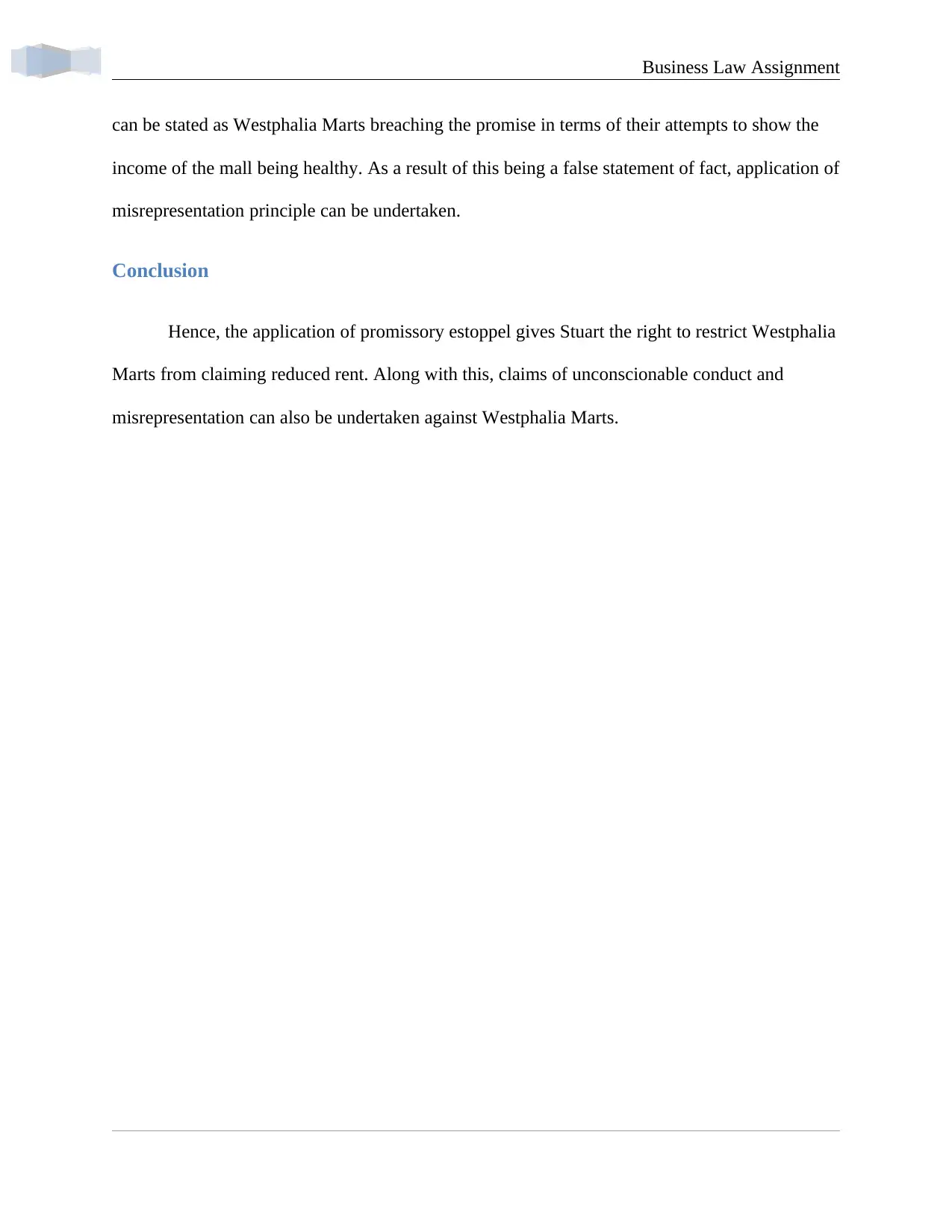
Business Law Assignment
can be stated as Westphalia Marts breaching the promise in terms of their attempts to show the
income of the mall being healthy. As a result of this being a false statement of fact, application of
misrepresentation principle can be undertaken.
Conclusion
Hence, the application of promissory estoppel gives Stuart the right to restrict Westphalia
Marts from claiming reduced rent. Along with this, claims of unconscionable conduct and
misrepresentation can also be undertaken against Westphalia Marts.
can be stated as Westphalia Marts breaching the promise in terms of their attempts to show the
income of the mall being healthy. As a result of this being a false statement of fact, application of
misrepresentation principle can be undertaken.
Conclusion
Hence, the application of promissory estoppel gives Stuart the right to restrict Westphalia
Marts from claiming reduced rent. Along with this, claims of unconscionable conduct and
misrepresentation can also be undertaken against Westphalia Marts.
⊘ This is a preview!⊘
Do you want full access?
Subscribe today to unlock all pages.

Trusted by 1+ million students worldwide
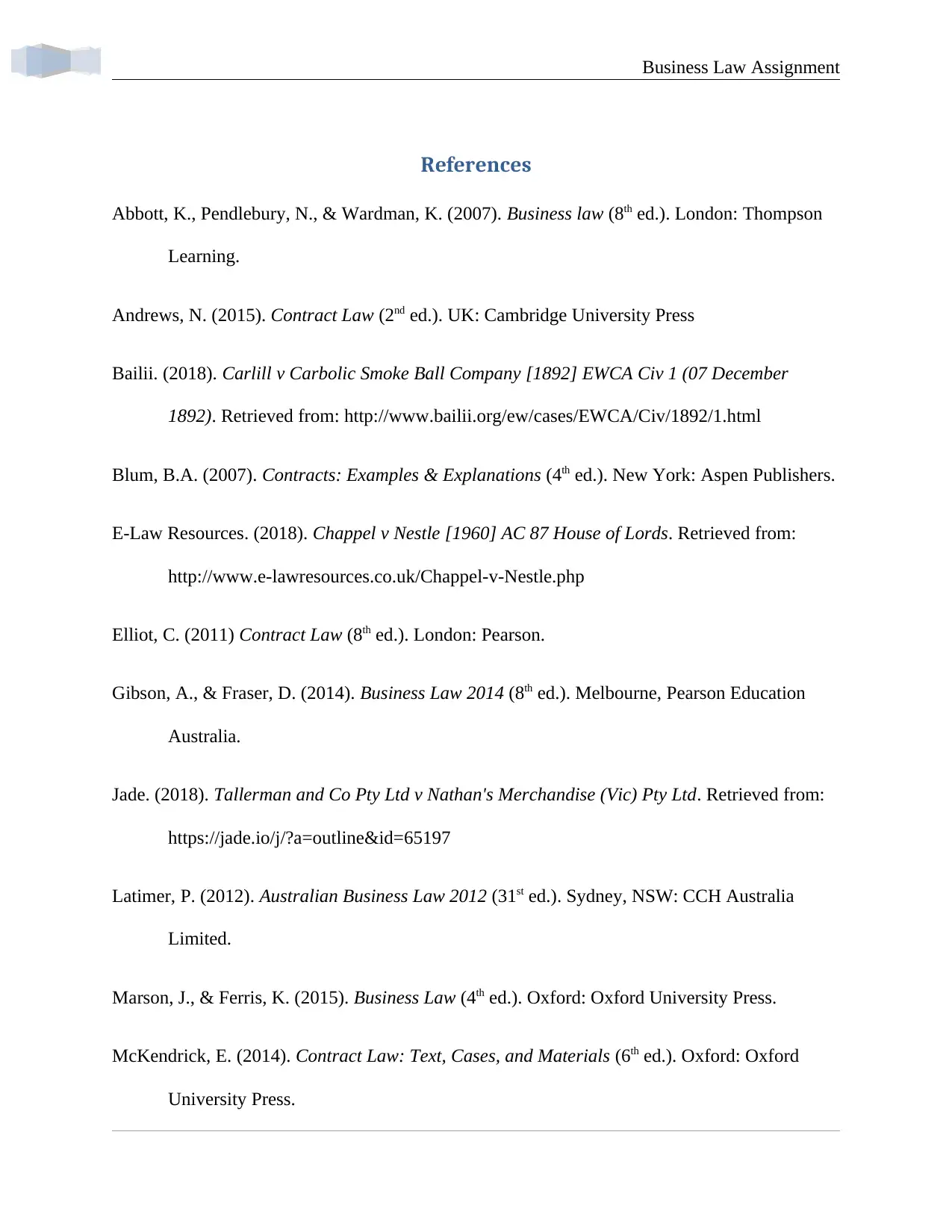
Business Law Assignment
References
Abbott, K., Pendlebury, N., & Wardman, K. (2007). Business law (8th ed.). London: Thompson
Learning.
Andrews, N. (2015). Contract Law (2nd ed.). UK: Cambridge University Press
Bailii. (2018). Carlill v Carbolic Smoke Ball Company [1892] EWCA Civ 1 (07 December
1892). Retrieved from: http://www.bailii.org/ew/cases/EWCA/Civ/1892/1.html
Blum, B.A. (2007). Contracts: Examples & Explanations (4th ed.). New York: Aspen Publishers.
E-Law Resources. (2018). Chappel v Nestle [1960] AC 87 House of Lords. Retrieved from:
http://www.e-lawresources.co.uk/Chappel-v-Nestle.php
Elliot, C. (2011) Contract Law (8th ed.). London: Pearson.
Gibson, A., & Fraser, D. (2014). Business Law 2014 (8th ed.). Melbourne, Pearson Education
Australia.
Jade. (2018). Tallerman and Co Pty Ltd v Nathan's Merchandise (Vic) Pty Ltd. Retrieved from:
https://jade.io/j/?a=outline&id=65197
Latimer, P. (2012). Australian Business Law 2012 (31st ed.). Sydney, NSW: CCH Australia
Limited.
Marson, J., & Ferris, K. (2015). Business Law (4th ed.). Oxford: Oxford University Press.
McKendrick, E. (2014). Contract Law: Text, Cases, and Materials (6th ed.). Oxford: Oxford
University Press.
References
Abbott, K., Pendlebury, N., & Wardman, K. (2007). Business law (8th ed.). London: Thompson
Learning.
Andrews, N. (2015). Contract Law (2nd ed.). UK: Cambridge University Press
Bailii. (2018). Carlill v Carbolic Smoke Ball Company [1892] EWCA Civ 1 (07 December
1892). Retrieved from: http://www.bailii.org/ew/cases/EWCA/Civ/1892/1.html
Blum, B.A. (2007). Contracts: Examples & Explanations (4th ed.). New York: Aspen Publishers.
E-Law Resources. (2018). Chappel v Nestle [1960] AC 87 House of Lords. Retrieved from:
http://www.e-lawresources.co.uk/Chappel-v-Nestle.php
Elliot, C. (2011) Contract Law (8th ed.). London: Pearson.
Gibson, A., & Fraser, D. (2014). Business Law 2014 (8th ed.). Melbourne, Pearson Education
Australia.
Jade. (2018). Tallerman and Co Pty Ltd v Nathan's Merchandise (Vic) Pty Ltd. Retrieved from:
https://jade.io/j/?a=outline&id=65197
Latimer, P. (2012). Australian Business Law 2012 (31st ed.). Sydney, NSW: CCH Australia
Limited.
Marson, J., & Ferris, K. (2015). Business Law (4th ed.). Oxford: Oxford University Press.
McKendrick, E. (2014). Contract Law: Text, Cases, and Materials (6th ed.). Oxford: Oxford
University Press.
Paraphrase This Document
Need a fresh take? Get an instant paraphrase of this document with our AI Paraphraser
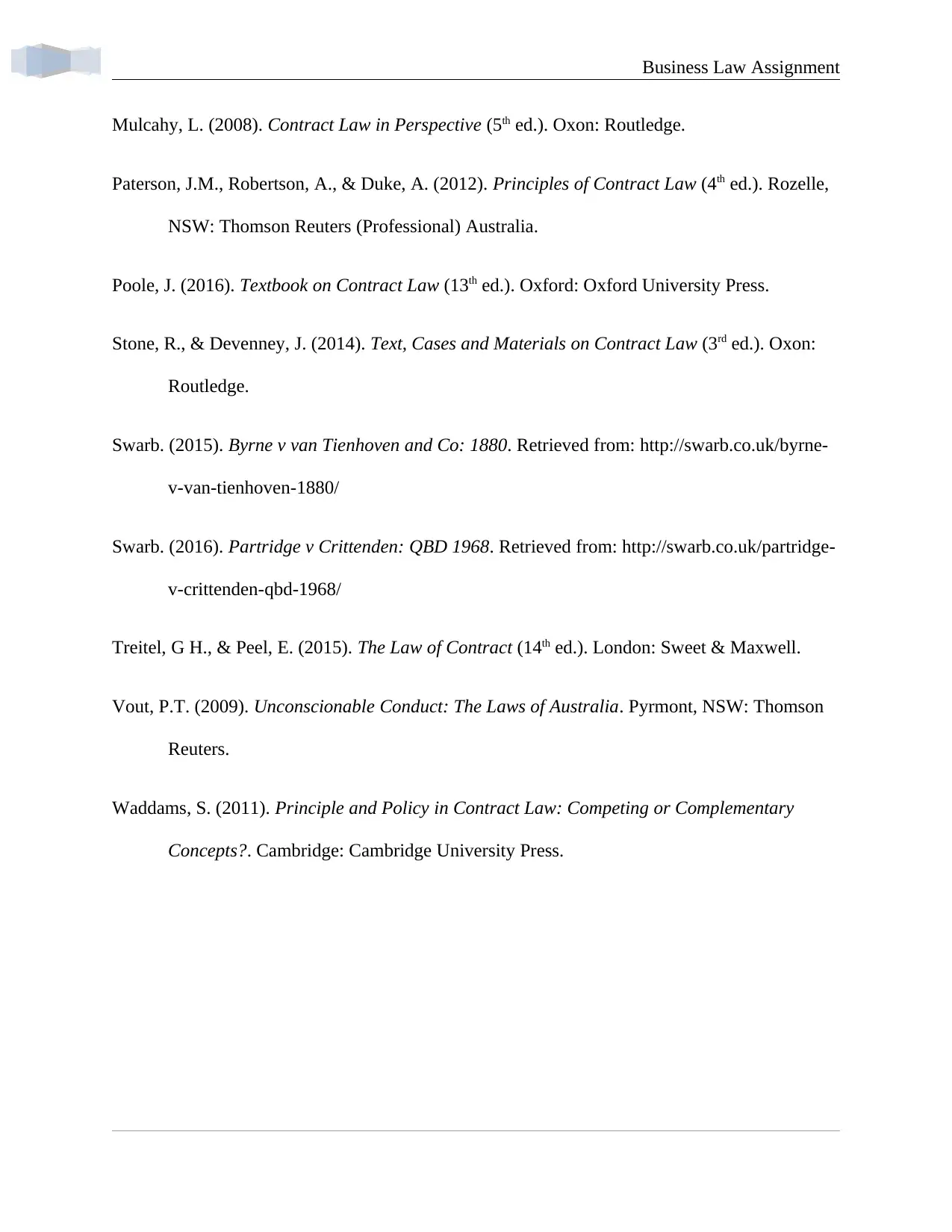
Business Law Assignment
Mulcahy, L. (2008). Contract Law in Perspective (5th ed.). Oxon: Routledge.
Paterson, J.M., Robertson, A., & Duke, A. (2012). Principles of Contract Law (4th ed.). Rozelle,
NSW: Thomson Reuters (Professional) Australia.
Poole, J. (2016). Textbook on Contract Law (13th ed.). Oxford: Oxford University Press.
Stone, R., & Devenney, J. (2014). Text, Cases and Materials on Contract Law (3rd ed.). Oxon:
Routledge.
Swarb. (2015). Byrne v van Tienhoven and Co: 1880. Retrieved from: http://swarb.co.uk/byrne-
v-van-tienhoven-1880/
Swarb. (2016). Partridge v Crittenden: QBD 1968. Retrieved from: http://swarb.co.uk/partridge-
v-crittenden-qbd-1968/
Treitel, G H., & Peel, E. (2015). The Law of Contract (14th ed.). London: Sweet & Maxwell.
Vout, P.T. (2009). Unconscionable Conduct: The Laws of Australia. Pyrmont, NSW: Thomson
Reuters.
Waddams, S. (2011). Principle and Policy in Contract Law: Competing or Complementary
Concepts?. Cambridge: Cambridge University Press.
Mulcahy, L. (2008). Contract Law in Perspective (5th ed.). Oxon: Routledge.
Paterson, J.M., Robertson, A., & Duke, A. (2012). Principles of Contract Law (4th ed.). Rozelle,
NSW: Thomson Reuters (Professional) Australia.
Poole, J. (2016). Textbook on Contract Law (13th ed.). Oxford: Oxford University Press.
Stone, R., & Devenney, J. (2014). Text, Cases and Materials on Contract Law (3rd ed.). Oxon:
Routledge.
Swarb. (2015). Byrne v van Tienhoven and Co: 1880. Retrieved from: http://swarb.co.uk/byrne-
v-van-tienhoven-1880/
Swarb. (2016). Partridge v Crittenden: QBD 1968. Retrieved from: http://swarb.co.uk/partridge-
v-crittenden-qbd-1968/
Treitel, G H., & Peel, E. (2015). The Law of Contract (14th ed.). London: Sweet & Maxwell.
Vout, P.T. (2009). Unconscionable Conduct: The Laws of Australia. Pyrmont, NSW: Thomson
Reuters.
Waddams, S. (2011). Principle and Policy in Contract Law: Competing or Complementary
Concepts?. Cambridge: Cambridge University Press.
1 out of 11
Related Documents
Your All-in-One AI-Powered Toolkit for Academic Success.
+13062052269
info@desklib.com
Available 24*7 on WhatsApp / Email
![[object Object]](/_next/static/media/star-bottom.7253800d.svg)
Unlock your academic potential
Copyright © 2020–2026 A2Z Services. All Rights Reserved. Developed and managed by ZUCOL.





